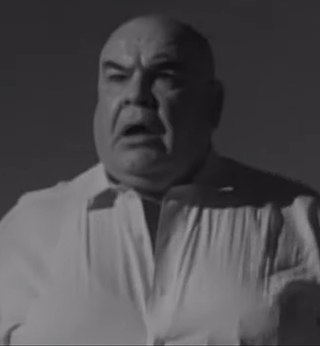
Stanislaus Pascal Franchot Tone was an American actor, producer, and director of stage, film and television. He was a leading man in the 1930s and early 1940s, and at the height of his career was known for his gentlemanly sophisticate roles, with supporting roles by the 1950s. His acting crossed many genres including pre-Code romantic leads to noir layered roles and World War I films. He appeared as a guest star in episodes of several golden age television series, including The Twilight Zone and The Alfred Hitchcock Hour while continuing to act and produce in the theater and movies throughout the 1960s.
The Alan Young Show is an American radio and television series presented in diverse formats over a nine-year period and starring English-born comedian Alan Young.

Karl Erik Tore Johansson, better known by the stage name Tor Johnson, was a Swedish professional wrestler and actor. As an actor, Johnson appeared in many B-movies, including some famously directed by Ed Wood. In professional wrestling, Johnson was billed as Tor Johnson and Super Swedish Angel.

Alan Mowbray was an English stage and film actor who found success in Hollywood.

Lux Video Theatre is an American television anthology series that was produced from 1950 until 1957. The series presented both comedy and drama in original teleplays, as well as abridged adaptations of films and plays.

The Woods Theatre was a movie palace at the corner of Randolph and Dearborn Streets in the Chicago Loop. It opened in 1918 and was a popular entertainment destination for decades. Originally a venue for live theater, it was later converted to show movies. It closed in 1989 and was demolished in 1990.

Alcoa Theatre is a half-hour American anthology series telecast on NBC at 9:30 pm on Monday nights from September 30, 1957 to May 23, 1960. For its first four months on the air, the title Turn of Fate was used as an umbrella title for Alcoa Theatre and its alternate-week counterpart, Goodyear Theatre.
Mackenzie's Raiders is an American Western television series starring Richard Carlson that was broadcast in syndication and produced in 1958–1959. The series is narrated by Art Gilmore, and was produced by Ziv Television Programs.
In the Kelvinator Kitchen was an NBC Television Network series which aired from 21 May 1947 to 30 June 1948. The series was a cooking show sponsored by Kelvinator, and the appliances used on the show were from that company.

The Eleventh Hour is an American medical drama about psychiatry starring Wendell Corey, Jack Ging and Ralph Bellamy, which aired on NBC from October 3, 1962, to September 9, 1964.

Breaking Point is an American medical drama that aired on ABC from September 16, 1963, to April 27, 1964. The series, which was a spin-off of Ben Casey, stars Paul Richards and Eduard Franz. The series was created by Meta Rosenberg.

The Silver Theatre is an American television series that was broadcast on CBS from October 3, 1949, to June 26, 1950, and was hosted by Conrad Nagel. It was also known as Silver Theater.

Telephone Time is an American anthology drama series that aired on CBS in 1956, and on ABC from 1957 to 1958. The series features plays adapted from short stories by John Nesbitt who hosted the first season. Frank C. Baxter became the host effective with the September 10, 1957, episode. He hosted the 1957 and 1958 seasons. A total of 81 episodes aired from April 1956 to March 1957 on CBS, and from April 1957 to April 1958 on ABC. The Bell Telephone System sponsored the series.

Studio 57 is an American anthology series that was broadcast on the now-defunct DuMont Television Network from September 1954 to July 1955, and in syndication from 1955 to 1958.

Walter Darwin Coy was an American stage, radio, film, and, principally, television actor, arguably most well known as John Wayne's character's brother in The Searchers (1956).

Martin Miller, born Johann Rudolph Müller, was a Czech-Austrian character actor. He played many small roles in British films and television series from the early 1940s until his death. He was best known for playing eccentric doctors, scientists and professors, although he played a wide range of small, obscure roles—including photographers, waiters, a pet store dealer, rabbis, a Dutch sailor and a Swiss tailor. On stage he was noted in particular for his parodies of Adolf Hitler and roles as Dr. Einstein in Arsenic and Old Lace and Mr. Paravicini in The Mousetrap.
Starlight Theatre is a 30-minute American television anthology series of romantic stories that aired on CBS from April 2, 1950, to October 4, 1951. Forty-nine episodes aired. In 1950-1951 it alternated with The George Burns and Gracie Allen Show.
Chevron Theatre is an American, 30-minute, filmed television anthology series, produced by MCA/Revue Productions for first-run syndication. A total of 105 episodes aired from 1952 to 1954.

Dick Powell's Zane Grey Theatre is an American Western anthology television series broadcast on CBS from October 5, 1956 until May 18, 1961.
"Strip Polka" is a 1942 novelty song with music and lyrics by Johnny Mercer. The music incorporates a polka beat; the lyrics are about Queenie, a burlesque performer who longs to quit her job and retire to life on a farm.













